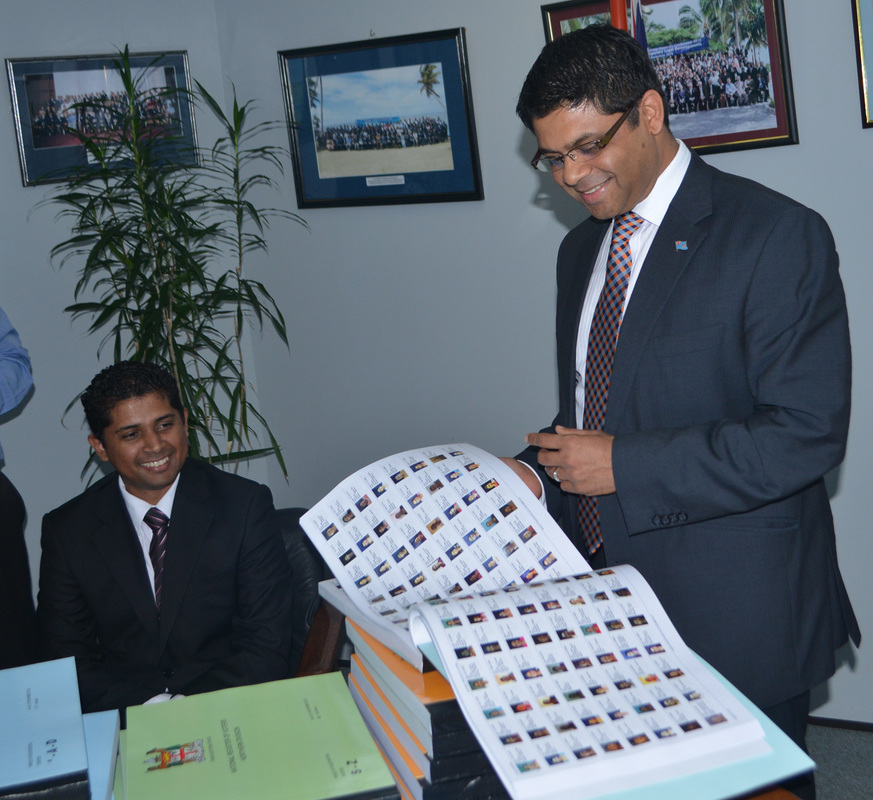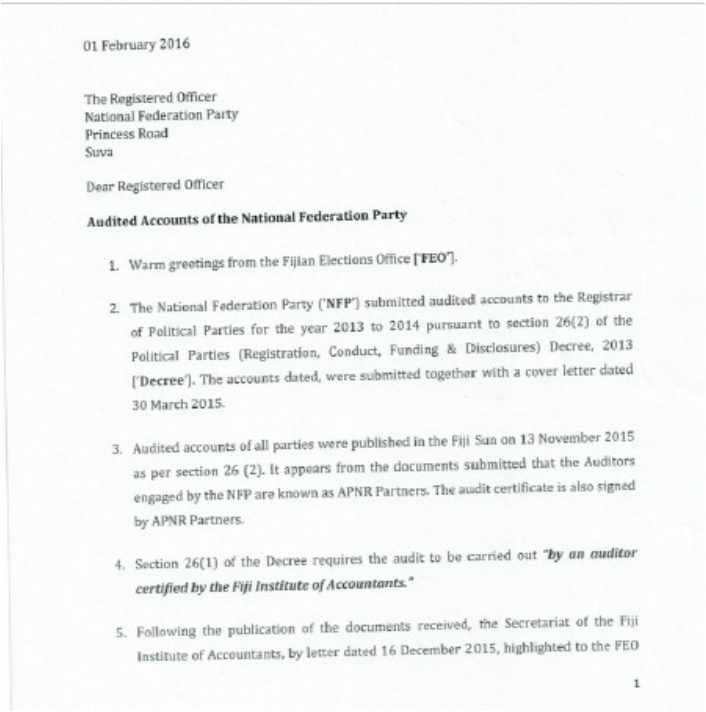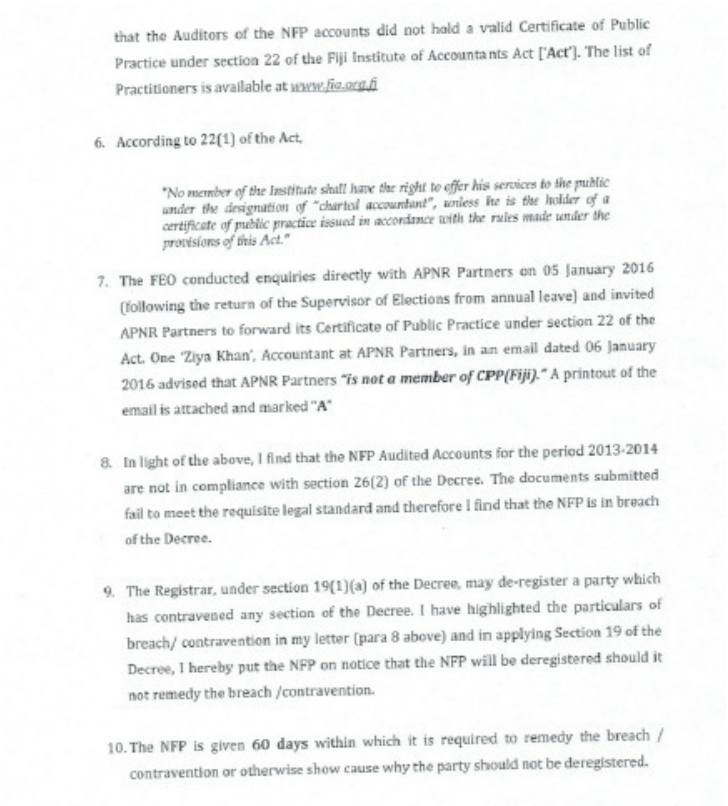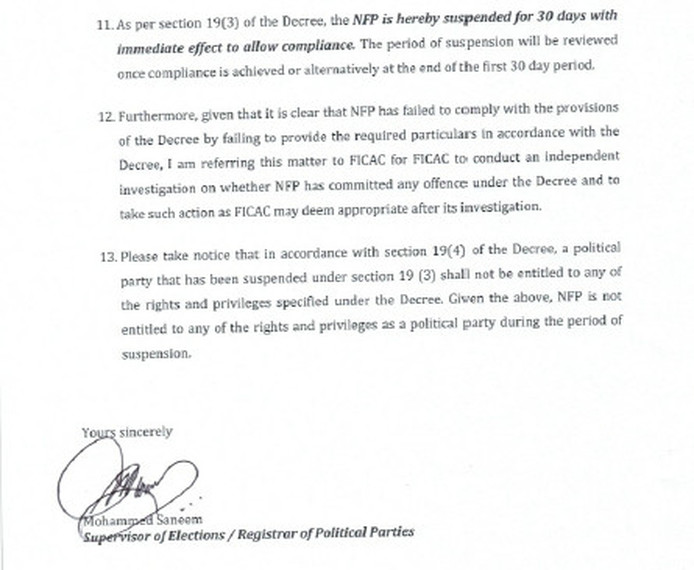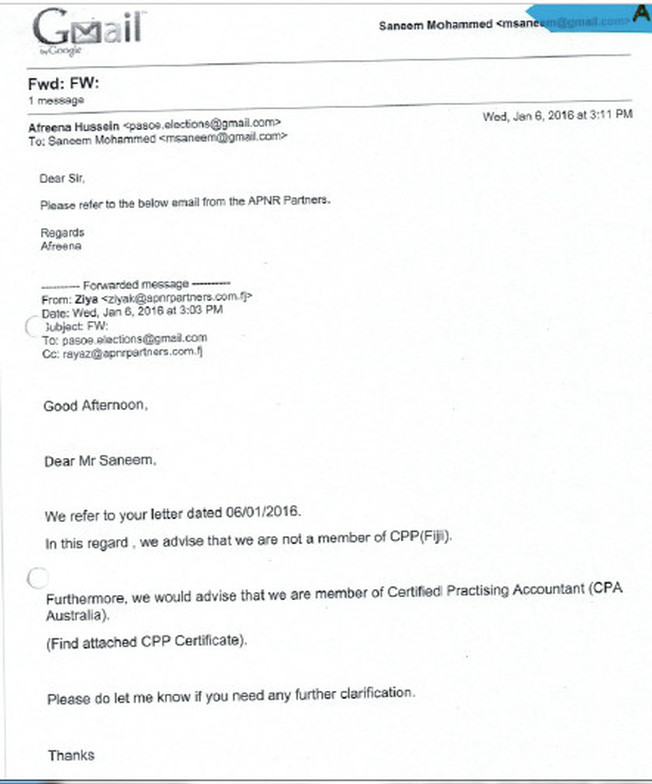The Letter to the Registrar of Political Parties was sent by Munro Leys after 2pm on Thursday 4th February. The Memorandum of Advice together with the Letter to the Registrar was sent on behalf of the three MPs by an NFP official to the Speaker of Parliament at 3.15pm on Thursday 4th February - before the Speaker released her ruling that the three Members would be noticed that they would be suspended as Members of Parliament for 30 days - the duration of NFP's suspension.
 Naidu
Naidu 4 February 2016 Our ref M999-009 RKN:ik
Your ref
Mr Mohammed Saneem
Registrar of Political Parties and Supervisor of Elections
59-63 High Street
Toorak
SUVA
By hand delivery
By email [email protected]
The Political Parties (Registration, Conduct, Funding and Disclosures) Decree 2013 (“Decree”)
Our client: The National Federation Party (“NFP”)
Your letter dated 1 February (“Letter”) and purported notice of suspension (“Suspension Notice”)
Introduction
1. NFP has handed to us your Letter and Suspension Notice for reply. We address each in turn below.
Letter
Qualifications of NFP’s auditors
2. You correctly state that under s. 26(2) of the Decree the accounts of a political party must be audited by an auditor certified by the Fiji Institute of Accountants. You incorrectly suggest2 that this means a person holding a certificate of public practice under s. 22 of the Fiji Institute of Accountants Act.
3. We assume you have now worked out that there is no such thing as an auditor certified by the Fiji Institute of Accountants. The Institute does not certify “auditors”. It certifies “members” who are either provisional, licensed, affiliate or chartered accountants, certain of whom (we call them “CPPs” for short) must hold certificates of public practice.
4. The (meaningless) reference to an auditor certified…[etc] in the Decree does not mean that only a CPP may audit the accounts of a political party. NFP argues that a member of APNR Partners, NFP’s auditors, holds an Institute-issued copy of a certificate saying he is a chartered accountant. Your interpretation of the phrase is no more or less correct than NFP’s.
5. You cannot, in interpreting the test for an auditor’s qualifications under the Decree, insert into the test words that do not exist. Other laws – for example the Trust Accounts Act, which sets the rules for trust account auditors3 – are explicit in requiring that only a CPP holder may conduct the audit. It is not clear what the Decree means, but you cannot hold NFP to a non-existent legal test.
6. Your Letter recites s.22 of the Fiji Institute of Accountants Act. That section does not deal with the question of who may audit the accounts of political parties. Your role is to interpret and apply s. 26(2) of the Decree. We refer you back to paragraph 2 of this letter. For the reasons above, paragraphs 7 and 8 of your Letter4 are irrelevant.
Purported decision to suspend
7. You have given notice to NFP to remedy its “breach” of the Decree under s.19(2). You have then purported to suspend NFP under s.19(3).
8. The power to suspend is exercised under s.19(3). That provision says that you may (emphasis added) suspend the registration of a political party to enable that political party to remedy the breach…In other words, it is a decision to be exercised in your discretion, to achieve a specified purpose. You do not have to suspend a political party.
9. As an accountable public officer, please explain:
(a) why you exercised your discretion to suspend NFP - clearly a decision to its detriment - without first giving it an opportunity to be heard on that decision, in accordance with the rules of natural justice
(b) why, given that the purpose of suspension is to enable [the] political party to remedy the breach, you thought that suspending NFP would achieve that. The power to suspend is not to punish. It is to enable compliance. Let us assume, for the purposes of argument, that you are right about the breach. NFP can remedy the breach just as easily when it is not suspended. So why did you suspend it? How would suspension “enable” NFP to remedy this particular breach?
10. What is of particular interest is that you were apparently advised on or about 16 December 2015 – more than six weeks before the date of your Letter – of the Institute’s concerns (valid or otherwise) about APNR Partners. Why were these concerns not drawn to NFP’s attention immediately, as natural justice would ordinarily require, to allow NFP to address them directly with you, or to allow NFP (if it chose) to take the relatively simple step of obtaining another audit?
11. Your reference of these facts to FICAC are noted and will be addressed separately.
12. Lastly, you advise that during the period of suspension NFP shall not be entitled to any of the rights and privileges specified under the Decree. We have searched but cannot find in the Decree any “rights and privileges” specified in the Decree for registered political parties. Accordingly please identify what “rights and privileges” under the Decree you believe NFP is no longer entitled to.
Suspension Notice
13. Most of the issues raised in the Suspension Notice are addressed above. However the Notice says that a party suspended under s.19(3) cannot operate, function, represent or hold itself out to be a political party. That prohibition does not exist under s.19. Please tell us why you claim this.
Conclusion
14. For the reasons above, we ask you to address the following matters to avoid an appeal to the High Court pursuant to s.30(1):
(a) please explain your reasoning for concluding that the s.26(2) words in the Decree, an auditor certified by the Fiji Institute of Accountants, mean “a person holding a Valid Certificate of Public Practice under s. 22 of the Fiji Institute of Accountants Act”
(b) please explain why you exercised your discretion to suspend NFP’s registration as a political party without first giving it the opportunity to be heard on that decision, particularly given that the matters giving rise to the suspension first came to your attention six weeks before your decision
(c) please explain why you believed, in the exercise of that discretion, that suspending NFP would “enable [it] to remedy the breach” you have specified in the Suspension Notice
(d) please explain:
(i) what “specified rights and privileges” are given to registered political parties under the Decree and
(ii) accordingly what NFP may or may not do while purportedly suspended
(e) please tell us why you say in the Notice that a suspended political party cannot operate, function, represent or hold itself out to be a political party. We cannot find any legal basis for this in the Decree.
15. We suggest that the correct steps for you to take are to:
(a) withdraw the purported suspension and
(b) bring to the attention of NFP your concerns about its audit in a reasonable and proportionate way (as s.16(1)(a) of the Constitution would appear to require). Whether NFP agrees or does not agree with what you say, it is a relatively simple matter for NFP, if it chooses, to obtain another audit, without the need for you to take sudden and precipitate action to suspend it.
16. Political parties do not exist for themselves or their office bearers. They exist to voice the political interests and concerns of their members, who are citizens of Fiji. To suddenly, disproportionately and unreasonably deprive the members of NFP of those rights is inimical to the democratic process and a breach of their political rights under s.23(1) of the Constitution. No doubt a person in your position understands this well.
Yours faithfully
MUNRO LEYS
Richard Naidu
Partner
*There seems to be some confusion about membership of “CPP(Fiji)”. There is no such thing as “CPP (Fiji)”.
From Munro Leys to NFP leader Biman Prasad:
Our ref M999-009 RKN:ik
Your ref
To
Dr Biman Prasad, Leader, National Federation Party
From
Richard Naidu
Date
4 February 2016
Purported suspension of NFP under Political Parties (Registration, Conduct, Funding and Disclosures) Decree 2013 (“Political Parties Decree”) – effect on the rights of NFP MPs in Parliament
Introduction
1. You have sought our advice on the above. In our view nothing that has occurred in recent days affects the rights of NFP’s MPs to take their seats in Parliament during the period of NFP’s purported suspension.
The legality of NFP’s suspension in the first place
2. We enclose a copy of our letter of today’s date to the Registrar of Political Parties and Supervisor of Elections. There is in our view some doubt whether NFP has breached the Decree at all and, even if it has, on the lawfulness of its suspension – but this advice assumes for these purposes that the suspension is lawful.
The Political Parties Decree
3. The rights of any MP to take his or her seat in Parliament flow from the Constitution and the Electoral Decree 2014. The Political Parties Decree does not restrict any of the rights of MPs of a party suspended for contravening the Decree (ie under s.19). Section 19(4) says that a suspended party is not…entitled to any of the rights and privileges specified under this Decree but there are no such rights (refer paragraph 13 of our letter to Mr Saneem). Even if it is claimed that such rights exist in the Political Parties Decree, none of these rights relate to whether or not an MP can take his or her seat in Parliament.
4. There is one gloss on what we say above, which is to be found at s.27(6) of the Political Parties Decree. Section 27 concerns the suspension of a political party which has committed an offence under the Political Parties Decree. In such a case, notwithstanding the suspension a National Federation Party 4 February 2016 2
person who is a member of a political party that has been suspended and is a member of Parliament, shall continue as a member of Parliament for the unexpired term.
5. That provision would tend only to reinforce the right of NFP’s MPs to take their seats in Parliament. If the Political Parties Decree expressly respects that right in the case of a party suspended for an offence against the Political Parties Decree, it must follow that the same right is respected in the case of a party suspended merely for an (alleged) contravention of the Decree (as NFP is). Constituents’ political rights
6. Finally, there is a perhaps obvious point that should not be lost in this debate. A Member of Parliament does not sit in Parliament for his or her own benefit. A Member of Parliament does so in service to those members of the public who voted for him or her (and subject to appropriate rules on Parliamentary behaviour, etc, which are not in issue here). To deprive an MP of a right to sit in Parliament deprives citizens of their political rights, including to have matters which are important to them aired by their political representatives in Parliament.
Conclusion
7. Accordingly:
(a) nothing in the Political Parties Decree – or in other legislation – restricts NFP’s MPs from taking their seats in Parliament because of the purported suspension of their party under s.19
(b) indeed the Political Parties Decree affirms, in more extreme circumstances of suspension, the right of suspended party MPs to take their seats and
(c) to deprive MPs of the right to take their Parliamentary seats would in any event deprive their constituents of their political rights, not a matter to be lightly undertaken.
Yours faithfully
MUNRO LEYS
Richard Naidu
Partner

